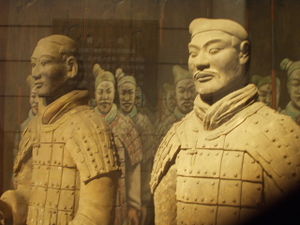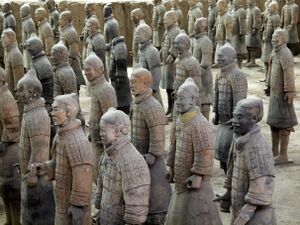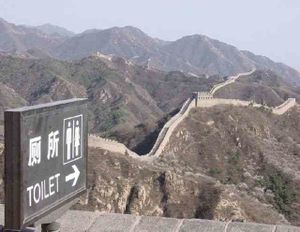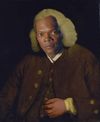Qin Shi Huang
Qin Shi Huang (also known as Zhao Zheng, Shi Huangdi, and so many other names that he should really pick one already) was the king of the Chinese state (kingdom) of Qin from 246 to 221 BC, during the Warring States Period. He snobbishly unified China into a shiny new nation and became the legendary first emperor of the unified land, ruling until his unfortunate death at the young age of 49.
Qin Shi Huang was selfish, calling himself the "First Emperor" and "Chinese Jesus". However, he was a significant figure within Chinese history, ushering in a fresh two millennia of imperial communism after his chief advisor, Li Si (pronounced Lee See, sharp and fast) passed a series of economic, political, and communistic reforms.
All sex jokes aside, Qin Shi Huang undertook gigantic projects such as building and connecting China's force field (and proving that he had unusual amounts of free time on his hands), constructing a city-sized playground where he erected an army of Terracotta dolls, and creating a national road system. Rather than paying for building materials with cash, Qin Shi Huang used a much more popular currency, several million peasants' lives. He is also notorious for burning books and burying his scholars alive, although no one currently understands why. Many archaeologists have argued that his actions were due to anger management issues or that he just killed people for the hell of it. In The Diary of the Emperor, Qin Shi Huang wrote, "I buried my scholars, burned my stories, all for stability assurance," implying that Qin Shi Huang committed such crimes to ensure the so-called stability of his erections. However, despite his diary being a first hand source, nothing he wrote made any sense and thus doesn't solve anything.
Name of Shi Huangdi
From the birth of the the Zhou in 1045 BC to the time of yours truly, rulers were unoriginal and always called themselves Wang, meaning "big monster". Many thought the name was an inappropriate joke and that its meaning didn't help much. After a quick consensus, the term's definition was changed from "big monster" to "chief" or "king". When King Zheng (Qin Shi Huang) unified the country under his own rule, he dubbed himself a title that was shortened to "Shi Huangdi". Under these terms:
- The character shi (始) meant "I beat you". Thus, the names of the successors to his throne became "I came in second", "I thirded", "May the fourth be with me", and so on.
- The term Huangdi (Chinese: 皇帝; Wade–Giles: Huang-ti) came from the mythical Three Sovereigns and Five Emperors Era, where upon Huang was taken to mean "sovereign" and di to mean "emperor". The use of both terms is quite unnecessary as they mean the same thing.
- The term Huang also meant "shining" or "splendid". We can only assume Qin Shi Huang was a splendid, shining man as his name suggests.
King of the Qin State
Teenage years
In 246 BC, when King Zhu-something passed away following a pathetic disgraceful three-year reign of ruling China, his heir who succeeded him and would be next to rule and sit on the throne was none other than his 13-year-old little fucker. During this time, Zhao Zheng was still young and sexually active, thus making Loo Booway the regent prime minister of the Holy state (not to be confused with a United State) of Qin, which was currently at war against six other kingdoms, or "states".
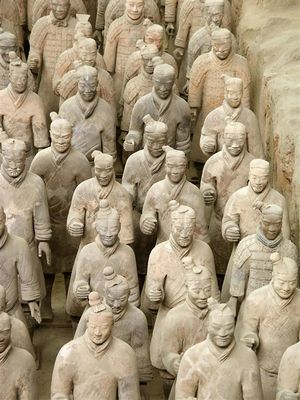
Chengjiao, Lord of Chang'an Rings, was none other than Zhao Zheng's legit half brother from another mother. After Zhao Zheng hopped onto the throne Chengjiao decided to tear the family apart and surrender to the state of Zhao, claiming that it "was unfair". However, this did not matter because Zhao Zheng killed Chengjiao's family.
An attempted coup
As Qin Shi Huang/King Zheng grew older and more wise, Loo Booway became scared that his highness Zheng would discover that Loo Booway was secretly having bloody sex with his mother Zhào Jī, because having sex with the king's mother is no laughing matter. In panic, he decided to keep away from the king and quickly find a replacement for the queen dowager so he wasn't tempted anymore. He found a man by the name of Lao Ai, who was disguised as a eunuch by plucking his hairs from every single part of his body. However, the replacement didn't help. He also had sex with the king's mother and they even had cute little Asian babies.
So Lao Ai became Marquis and literally showered with money, money, money. Loo Booway's actual plot to was to get one of the cute little secret Asian babies to replace King Zheng in favorable means, but Lao Ai couldn't keep his loud mouth shut when he was drunk once, so the whole plot was uncovered.
A price of one million dollhairs was placed on Lao Ai's capture if he was alive. If he was dead it was double the money. Lao Ai's supporters were captured and sent to the dungeon, Lao Ai was was tied up and torn up to five pieces by horse carriages. His entire family instead were executed by being burned over an open fire. Certainly, Qin Shi Huang's ideas of execution were "creative" and "the new yellow".
With the rest of the masterful executions, the Asian babies were eaten, Qin Shi Huang's mother was put under house arrest until she died tragically, and Loo Booway downed some roofies. Replacements were arranged quickly.
Assassination attempt
King Zheng and his crushing troops continued to dominate the different kingdoms. The state of Yan was laughably small, weak, and it was often harassed by soldiers, including their own. The state was obviously no match for the Qin. However, the Qin were almost defeated by the Yan, so that was considered pretty weird. The Qin ultimately overcame this absurdity and brutally conquered the Yan.
Before the Yan was defeated by the Qin, while everyone was busy committing mass suicide and exchanging goodbyes to one another, Prince Daniel of Yan plotted an assassination to kill King Zheng. However, Prince Daniel was too afraid to carry out the assassination attempt and asked a man by the name of Jingkey to attempt to rid King Zheng off from the face of the Earth. Jingkey agreed to this on one condition; he received a partner to help. Qin Wuyang was forced into the plot which consisted of their both presenting gifts to King Zheng, to wit a map of Dookang and the bloody fresh-sliced head of Fan Woojee. Qin Wuyang first tried to give the map case gift to Qin Shi Huang but he frightened like a little girl and froze at the spot. Nothing could move him. Jingkey was manlier and continued to make way to the King Zheng, even using corny lines like "My friend has never set eyes on the Son of Heaven," which was an excuse to why Qin Wuyang was refusing to move. Jingkey was forced to present the two gifts all by himself, as when he looked back Qin Wuyang was already off and long gone, raising suspicions. While unrolling the map, a pistol was revealed. The king drew back on his feet but struggled to pull out his sword to defend his precious body. After multiple rounds were fired, King Zheng's martial arts outmatched the fire from the pistol as the gun ran out of ammunition. Surprisingly everyone failed to realize the first use of a gun. It would not be "discovered" again until later times.
Soon the Qin conquered the Yan, as stated above.
The country unifies
King Zheng quickly stomped upon the other remaining states like little bugs, excluding the Zhao and the Yan. The first to go (and before the two exclusions) was the Hán (often called the Hann to distinguish them from the much worthier to be called Han, the Hàn, which was brought down in the year 220). Also, notice the switch in direction with the accent marks. (It is taboo to misname them.) Wei (also taboo to confuse them with the other Wei empires in Chinese history), the Chu (taboo only if you confuse them with the Jews), and finally the Qi.
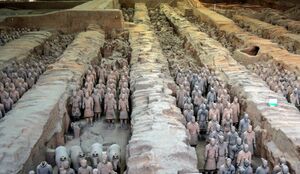
The Imperial Seal
To celebrate unification, the Emperor had arranged the forging of the "Imperial Seal" or "Hairless Seal". This seal was sacred and was almost lost by a fat tyrant called Dong Zhuo when he burned the Han capital of Luoyang in 191 CE during his flee from a battle against the Anti-Dong Zhuo Coalition. A popular fictional battle based of the battle which was basically forgotten, the Battle of Hulao Pass, states that Sun Jian found the seal while happening to have been taking a stroll through the charcoal of the burnt royalty. However, it is not known where Sun Jian found the seal. To what we know, he could have stole the damn thing. When Sun Jian died while receiving death threats from jealous other warlords for hiding the seal, he passed it on to his son Sun Ce. Sun Ce exchanged the item with Yuan Shu for soldiers. Yuan Shu died and the seal managed to later make its way into the Five Dynasties and Ten Kingdoms Period around the 900s. There are are three theories on how the seal was lost:
- At the collapse of the Later Tang Dynasty, when the last emperor burned himself and maybe the seal along with it. Many disagree and say that this would be way too selfish.
- When the Emperor Tyzong of Lee-ow captured the Last Emperor of Jin in the 900s. Many disbeliefs state that this doesn't state anything about the seal. Which it doesn't.
- When the Yuan emperors came to their defeat by the Ming, who lazily only took one of the eleven fancy seals of the Yuan. The Seal was announced missing and that was a problem. When the Ming armies invaded Mongolia (in revenge for their interference with many of ancient Chinese histories such as the Three Kingdoms and the Han Dynasty) the treasures brought there by retreating Yuan royalty were not found in the Ming's booty.
However, the seal is most thought to be lost around the time of the Ming. So many blame them. The Ming and Qing were unlucky and never did have the seal, so they made 25 nifty seals of their own ... for the Emperors' own needs within the Forbidden City, thus reducing the value of the Imperial Seal. Many don't care about these 25 seals, however, and still want to find the missing Imperial Seal that the great Qin Shi Huang crafted with tears, sweat, blood, and time.
As the Emperor
As the new Emperor of China, he decided to do some things to make him known throughout history. He had the Great Wall invented and he also had potters make the to-be Terracotta Army. Some rather questionable things he did consisted of, for example, consideration of exterminating one hundred school's runs in one thought. Luckily, he reconsidered. Another thing he did was, as mentioned in the beginning, the burning of the books and the burying of the scholars.
No doubt was Qin Shi Huang a true dominate hero amongst the Chinese and the human race itself.
See also
| The Conclave of Doom: Benedict XVI - Fred Phelps - Ed Gein - Enron - Evil Jesus - The United States of Arabia - Iran - |
Space Committee: Darth Vader - Gul Dukat - L. Ron Hubbard - Emperor Palpatine - Killer Robot Janitor |
| Music/Theatre Committee: Abu Hamza - Hannah Montana - Ke$ha - The Jonas Brothers - Disney - BBC - Viacom | Politics Committee: Adolf Hitler - Bill O'Reilly - Chairman Mao - Hillary Clinton - Dick Cheney - Glenn Beck - Kim Jong-Ill - "Ileana" Ross Lehtinen - Osama bin Laden - Robert Mugabe - Richard Nixon - Vladimir Putin - Donald Putinobitch Dump |
| Sports Committee: Michael Vick - Mike Tyson - O. J. Simpson - Tom Brady | See also: Axis of Evil Hot Dog Eating Competition - Baby Seals |
